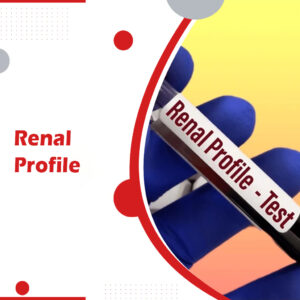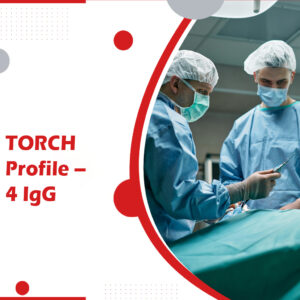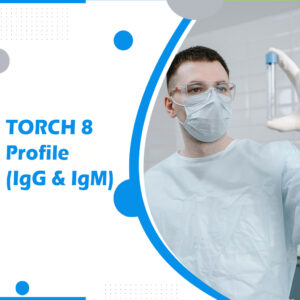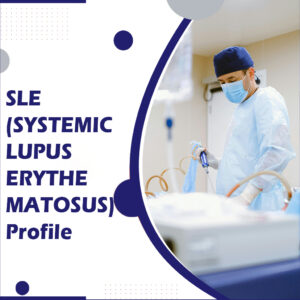Heart

Coronary Artery Disease
Coronary artery disease that affects the arteries. It is the most common type of heart disease.
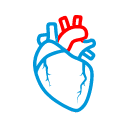
Valvular Heart Disease
Valvular Heart Disease that affects the function of the valves which regulates blood flow in and out of the heart

Arrhythmia
Arrhythmia that affects the electrical conduction
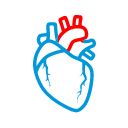
Cardiomyopathy
Cardiomyopathy that affects how the heart muscles squeeze

Congenital Heart Defects
Congenital heart defects that develop before birth
Heart Tests / Packages

Symptoms of Heart Disease

Chest pain
It's a discomfort caused when there is less supply of oxygen-rich blood to our heart. It may feel like pressure, crushing or squeezing in your chest.

Shortness of Breath
Shortness of breath, or dyspnea, is an uncomfortable condition that makes it hard to completely get air into your lungs. Problems with lungs and heart can harm your breathing.

Sweating
If there is excessive sweating more than usual without an involvement of any physical activity or hot conditions than it could be an early sign of heart problems.

Nausea
A discomfort that creates an urge to vomit. If its prolonged, it can be a sign of health disease.

Irregular Heart Beat
It's a change in heart beat frequency and occur when the electrical signals that coordinate with heart beat do not function properly.
The heart is the most important organ of the circulatory system, which helps deliver blood to the body. It works with the lungs to add oxygen to blood and pump this freshly oxygenated blood through the blood vessels and around the body.
The heart also has an electrical system within. Electrical impulses within the heart help ensure that it beats with a consistent rhythm and proper rate.
The heart rate increases when the body needs more blood, such as during intense exercise. It decreases during times of rest.
The heart has four chambers. The two upper chambers are called atria, and the two lower chambers are called ventricles.
Blood flows into the right atrium from the veins of the heart and body (except the lungs), then it flows into the right ventricle. From there, it flows into the pulmonary artery, which has branches that reach the lungs. The lungs then oxygenate the blood.
This oxygenated blood travels from the lungs, through pulmonary veins that lead back and join together, to the left atrium, and then through the left ventricle. From there, the heart pumps the blood through an artery that branches to distribute blood to itself and other body parts (except the lungs).
The heart has four valves that ensure that blood flows in the right direction. The heart valves are:
- The Tricuspid valve
- The Pulmonary valve
- The Mitral valve
- The Aortic valve

Basic Tests
Lipid Panel Blood Test
The Lipid Panel Blood Test evaluates hyperlipidemia as an index to coronary artery disease.
Prothrombin Time (PT) w/INR Blood Test
The PT/INR Blood Test reports both PT and INR values, although the INR value is more applicable for patients on Warfarin; it is used to adjust dosage to get the PT in the appropriate range.
C-Reactive Protein (CRP) Blood Test, High Sensitivit…
The high-sensitivity CRP test measures low levels of CRP in the blood. The measurement is used to identify low levels of inflammation associated with the risk of developing cardiovascular disease (CVD).
Sedimentation Rate Blood Test, Westergren
A Sedimentation Rate Blood Test, Westergren evaluates the nonspecific activity of infections, inflammatory states, autoimmune disorders, and plasma cell dyscrasias.
Homocysteine Blood Test
The Homocysteine Blood Test measures the level of homocysteine, an amino acid, in your blood.
Creatine Kinase (CK) Blood Tst, Total
A CPK test is a blood test used to evaluate levels of creatine kinase (CK), an enzyme released when muscle damage occurs.
D-Dimer Blood Test
A D-Dimer Blood Test rules out deep vein thrombosis (DVT) and pulmonary embolism; evaluate disseminated intravascular coagulation; can be used to monitor the extent of clot lysis during thrombolytic therapy.
LUPUS Auto-Immune Blood Test Panel
A LUPUS blood test includes: Antinuclear Antibodies (ANA) Direct, Complete Blood Count with Differential and Platelets (CBC), Urinalysis Complete, Rheumatoid Arthritis (RA) Factor, Sedimentation Rate (ESR), C-Reactive Protein (CRP) High Sensitivity Cardiac Risk, Comprehensive Metabolic Panel – 14 tests, Prothrombin Time (PT) and Partial Thromboplastin Time (PTT).
Electrolyte Blood Test Panel
The Electrolyte Panel is performed to check for kidney problems, acids in your blood, a sodium or potassium problem and diabetes.
Lipoprotein (a) Blood Test
A Lipoprotein (a) Blood Test measures the level of a particular type of lipoprotein which can increase a person’s risk for cardiovascular disease.
Fibrinogen Activity Blood Test
The Fibrinogen Activity Test is used to check for fibrinogen, coagulation factor, a protein that is essential for blood clot formation.
B-Type Natriuretic Peptide (BNP) Blood Test
The BNP Blood Test is used to support a diagnosis of congestive heart failure (CHF).
Lactate Dehydrogenase (LD) Isoenzymes Blood Test
A Lactate Dehydrogenase (LD) Isoenzymes Blood Test helps identify the cause and location of tissue damage in the body and to monitor its progress.
Lactic Acid Dehydrogenase (LD) Blood Test
A LD or LDH Blood Test measures lactic acid dehydrogenase an enzyme that is elevated in case of any tissue damage or injury.
Aldosterone Blood Test, LC-MS
The aldosterone blood test is used to evaluate patients with hypertension and for the possibility of hyperaldosteronism.
Low-density Lipoprotein Cholesterol (Direct) Blood T…
A Low-density Lipoprotein Cholesterol (Direct) Blood Test is used for the direct determination of LDL cholesterol.
Apolipoprotein Assessment Blood Test
Apolipoprotein Assessment Blood Test evaluates risk of cardiovascular disease and includes apolipoprotein A-1, apolipoprotein B, and apolipoprotein B/A1 ratio.
Aldolase Blood Test
An aldolase blood test looks for damage to muscles, liver or the heart.
Coenzyme Q10 Blood Test
A Coenzyme Q10 Blood Test measures blood levels of Coenzyme Q10 (CoQ10).
Omega-3 and -6 Fatty Acids Blood Test
An Omega-3 and -6 Fatty Acids Blood Test is useful in measuring the essential fatty acids.
NT-pro BNP Blood Test
NT-pro BNP Blood Test is used to support a diagnosis of congestive heart failure (CHF).
Apolipoprotein B Blood Test
An apolipoprotein B blood test is useful in evaluating the risk of developing cardiovascular disease and monitoring treatment for high cholesterol.
Lipoprotein-Associated Phospholipase A2 (PLAC) Blood…
The PLAC Test is a blood test that measures an enzyme associated with the inflammation of your arteries.
High-density Lipoprotein (HDL) Cholesterol Blood Tes…
The High-density Lipoprotein Cholesterol Blood Test is used along with other lipid tests to screen for unhealthy levels of lipids and to determine the risk of developing heart disease.
VLDL Cholesterol Blood Test
A VLDL Cholesterol Blood Test is useful in measuring the amount of very low-density lipoprotein (VLDL) in your blood.
Carnitine Total and Free Blood Test
This Carnitine Total and Free Blood Test measures your blood’s amount of a substance called carnitine. It compares the amount of carnitine that is usable or ” free ” to the total amount in your body.
Aldosterone:Renin Ratio Blood Test
Aldosterone-renin activity ratio blood test measures the levels of the hormones aldosterone and renin in your blood.
Myoglobin Serum Test
A myoglobin serum test is ordered to diagnose skeletal or myocardial muscle injury.
Lp-PLA2 Activity Blood Test
A Lp-PLA2 Activity Blood Test is useful in measuring the amount of Lp-PLA2 in the blood.
Catecholamines without Creatinine Urine Test, Fracti…
Fractionated catecholamine measurement is useful in the diagnosis of pheochromocytoma and its differentiation from essential hypertension.
Myeloperoxidase Antibody (MPO) Blood Test
The MPO Blood Test measures the antibody levels of Myeloperoxidase. Elevated Myeloperoxidase antibodies are associated with vascular diseases, lupus, and other inflammatory conditions.
Galectin-3 Blood Test
A Galectin-3 Test may be ordered for the identification of individuals with chronic heart failure at elevated risk of disease progression.
Lipoprotein Phenotyping Profile Blood Test
A Lipoprotein Phenotyping Profile Blood Test is used to evaluate hyperlipidemia (high Cholesterol) to determine abnormal lipoprotein distribution and concentration in the serum.
Pyruvic Acid Blood Test
A Pyruvic Acid Blood Test is used to measure the amount of pyruvate in the blood.
Fibrinogen Antigen Blood Test
The fibrinogen antigen blood test is used in the diagnosis of homozygous and heterozygous fibrinogen deficiency as well as dysfibrinogenemia; diagnosis of disseminated intravascular coagulation; fibrinogen levels can be used to assess the effectiveness of thrombolytic therapy.
AspirinWorks; (11-Dehydro Thromboxane B2) Urine Test…
The AspirinWorks Test Kit is an enzyme-linked immunoassay (ELISA) to determine levels of 11-dehydrothromboxane B2 (11dhTxB2) in human urine, which aids in the qualitative detection of aspirin effect in apparently healthy individuals post ingestion.
Digoxin Blood Test
The Digoxin Blood Test is useful in determining the level of the medication digoxin in the blood.
Protein C Functional Blood Test
The Protein C Functional Blood Test is used to help investigate a possible clotting disorder.
Protein C Antigen Blood Test
A Protein C Antigen Blood Test is used the confirmation and characterization of protein C deficiency.
Apolipoprotein A1 Blood Test
An Apo A1 blood test measures the A1 protein that has a specific role in the metabolism of lipids and is the main protein component in HDL, the “good cholesterol”.
High Sensitivity C-Reactive Protein Blood Spot – ZRT…
C-Reactive Protein is a proven marker of inflammation and may contribute significantly to cardiovascular disease’s pro-inflammatory and pro-thrombotic components.
Are You at Risk for Heart Disease?

Smoking
The action or habit of inhaling and exhaling the smoke of toxic substances like tobacco or a drug.

Hypertension
Hypertension is also called high blood pressure. It can lead to severe health complications and increase the risk of heart disease, stroke, and sometimes death.

High Cholesterol
High blood cholesterol is a condition that causes the levels of certain bad fats, or lipids, to be too high in the blood and is caused by lifestyle factors, such as diet.

Diabetes
A disease in which the body's ability to produce or respond to the hormone insulin is impaired, resulting in abnormal metabolism of carbohydrates and elevated levels of glucose in the blood.

Family history of Heart Diseases
A family history of heart disease is generally defined by having a first-degree male relative (i.e., father or brother) who had a heart attack by age 55, or a first-degree female relative (i.e., mother or sister) by age 65.

Obesity
The state of being well above one's normal weight. A person has traditionally been considered to be obese if they are more than 20 percent over their ideal weight.
How is Heart Disease Diagnosed?
Personal and Family medical history
Current and past symptoms
Laboratory tests and an electrocardiogram.
Laboratory Tests Related to Heart Disease
Lipid profile
Total Cholesterol
LDL Cholesterol
HDL Cholesterol
Triglycerides
Lipoprotein Lp (a)
The test is used to identify an elevated level of Lipoprotein (a) that carries cholesterol in the blood. The test evaluates the risk of developing Cardiovascular disease (CVD).
C-reactive protein (CRP)
C-reactive protein (CRP) is produced by the Liver as part of the body's response to injury or infection. The test measures the amount of CRP in the blood to detect inflammation due to acute conditions, monitor the severity of disease in chronic conditions and helps create an overall picture of heart health.
Homocysteine
Homocysteine is used to build and maintain tissue. However, too much Homocysteine may increase the risk of heart disease and stroke. This test is usually ordered if you have a high risk of developing heart disease or have a family history of heart disease. It is also used for cases of family history of heart disease but no other known risk factors.
HsCRP
New age test to assess the risk of developing heart attack, stroke. It accurately measures low but persistent levels of inflammation in the body that is associated with Atherosclerosis
CK-MB
Creatine kinase-MB (CK-MB) is a form of an enzyme found primarily in heart muscle cells. This test measures CK-MB in the blood. CK-MB will typically only be present in significant amounts when the heart is damaged.
Troponin -T, I (High Sensitive)
High-sensitivity troponin tests are primarily ordered to help diagnose a heart attack and rule out other conditions with similar signs and symptoms. Levels of troponin can become elevated in the blood within 3 to 6 hours after heart injury and may remain elevated for 10 to 14 days.
BNP and NT-proBNP
B-type natriuretic peptide (BNP) and N-terminal pro b-type natriuretic peptide (NT-proBNP) are released by the body as a natural response to heart failure. Tests for BNP and NT-proBNP measure their levels in the blood to detect and evaluate heart failure.
APOLIPOPROTEINS A1 & B
Apo A-1 is the main protein component of HDL, the 'good cholesterol'. Apo B is the main protein associated with LDL, the 'bad cholesterol'. Apo A-1 and Apo B are better indicators than LDL Cholesterol etc. and determine the risk of developing cardiovascular disease (CVD).
Blood Tests for Other Body Systems
Complete blood count (CBC)
CBC is a series of tests that measure red blood cells, white blood cells and platelets.
Sodium and potassium levels
Sodium and potassium levels help in detecting a problem with electrolytes in the body fluids.
Blood urea nitrogen and Creatinine
Blood urea nitrogen and creatinine are measured to check kidney function.
Fasting glucose
Fasting glucose is performed to diagnose diabetes or pre-diabetes.
TSH
TSH is measured to check thyroid function.
Non Invasive Tests
Electrocardiogram
An Electrocardiogram (EKG or ECG) is a graphic measure of the electrical activity in the heart. The specific patterns on the EKG helps to determine abnormalities such as atrial fibrillation (an abnormal rhythm), or heart attack.
Stress EKG
Stress tests are performed to see how the heart performs under physical stress e.g. with exercise on a treadmill. The EKG wires record electrical signals of the heart while exercising along with Blood Pressure.
Thallium Scan
It involves a treadmill stress test and scanning of the heart via nuclear camera after injection of a radionuclide material. It determines the amount of blood the heart muscle is receiving during rest and stress.
Carotid Ultrasound
Carotid ultrasound is used to evaluate the risk of stroke. A small probe called a transducer is gently pushed against the sides of the neck, which sends images of arteries to a computer screen. It is used to check for Stenosis by monitoring blood flow through the carotid arteries on both sides of the neck.
Holter Monitor
A Holter monitor enables continuous recording of EKG during your daily activities. It can detect arrhythmias that might not show up on a resting EKG.
Invasive Tests
The blood vessels in the heart have narrowed
The heart is pumping normally
The valves in the heart are functioning normally
There are any congenital heart abnormalities
The pressures in the heart and the lungs are normal



